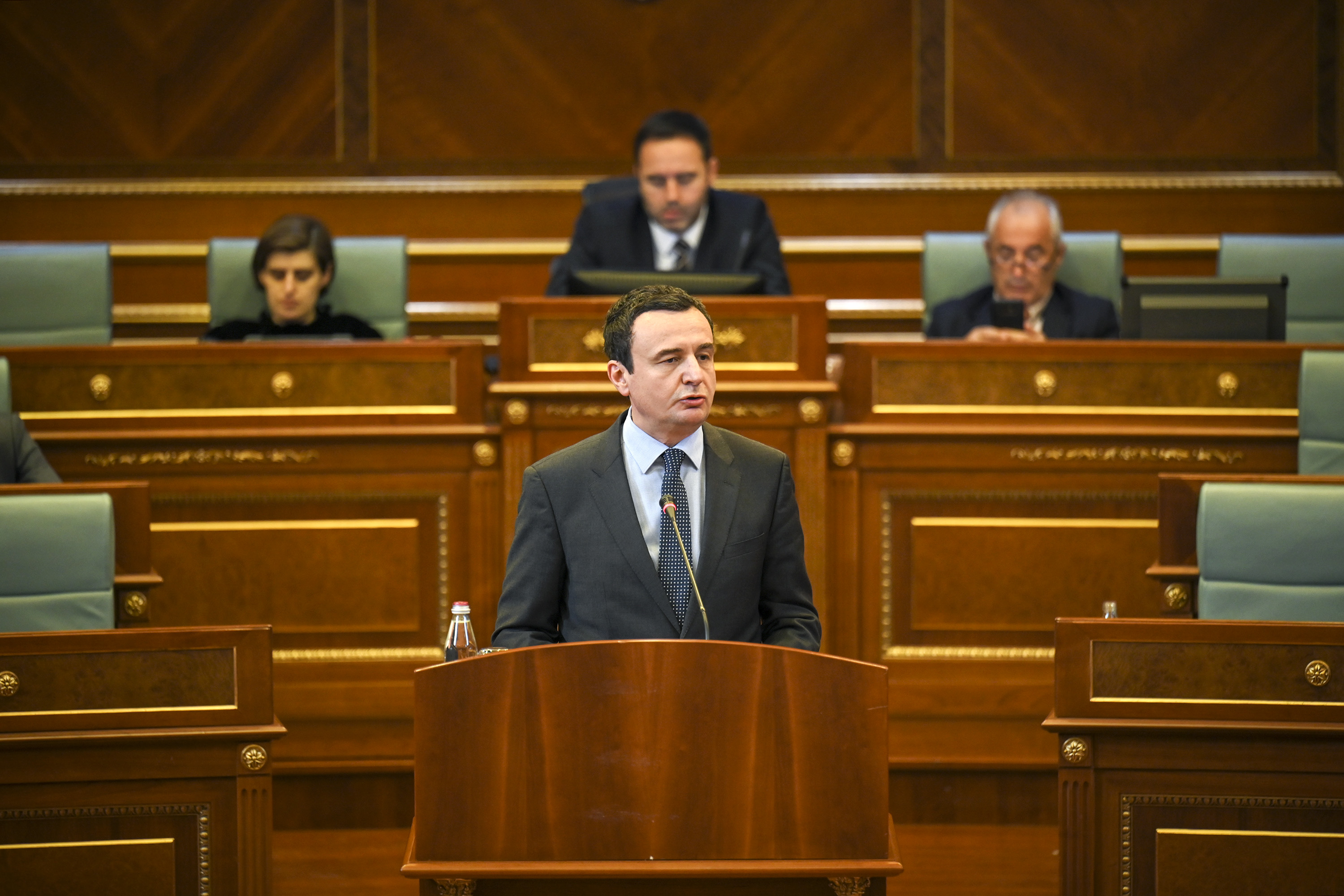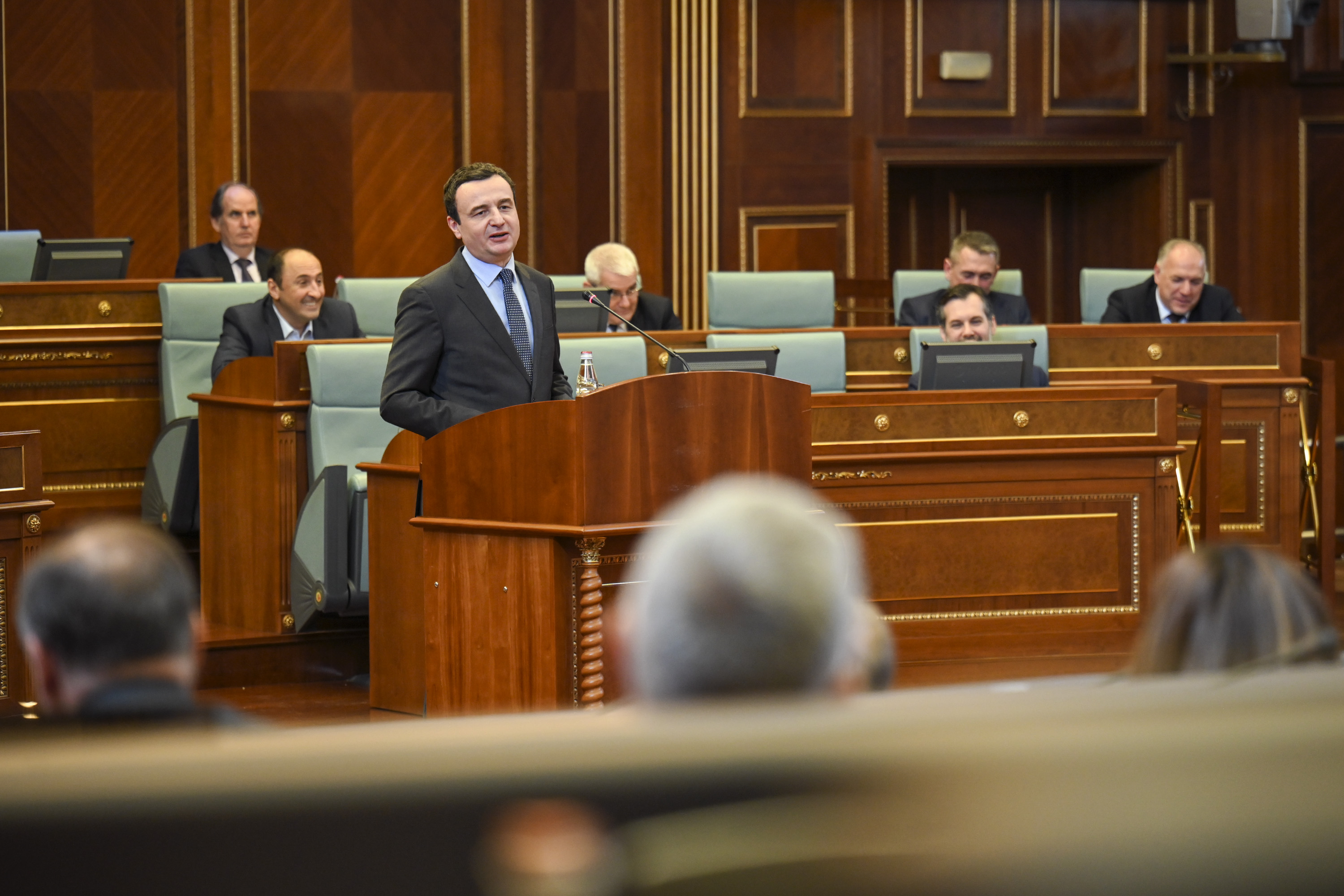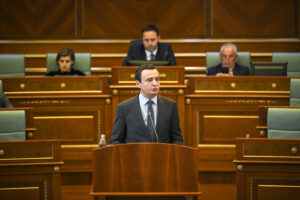Pristina, March 2, 2023
Thank you, Speaker Konjufca,
Dear Members of the Assembly,
Dear citizens of the Republic,
I am in front of you today to inform and report on the last high-level meeting within the Dialogue with Serbia mediated by the European Union, which as we know was held on Monday of this week, that is on February 27. The meeting was officially invited by the High Representative for Foreign Policy and the Vice President of the European Commission, Mr. Josep Borrell with two points of the agenda. First, the formalization of the acceptance of the Basic Agreement proposed by the European Union, supported by Germany, France, Italy and the United States of America. And, secondly, the beginning of discussions on the implementation plan of this agreement. Let me point out that there is often a misunderstanding regarding these two documents. The EU has officially proposed only one document, the Basic Agreement between Kosovo and Serbia. The implementation plan will have to be negotiated, and negotiations for it have not yet begun.
At the high-level meeting on February 27, I was a participant in two types of meetings. Initially, bilaterally, with Representative Borrell and Facilitator Lajcak, and, after that, in the trilateral meeting where the President of Serbia, Vucic, was also present. At the trilateral meeting, I offered the European Union the official signature as Prime Minister of the Republic of the Basic Agreement, which both Representative Borrell and President Vučić would have to sign and the same should be approved at a European Council summit. My proposal to officially sign the agreement was immediately rejected by the president of Serbia. His refusal was of a categorical nature, which he himself made public after leaving the meeting. Let me clarify that Representative Borrell’s position, as stated in his press release, is that this document will not be discussed any further; therefore, it has a finalized format and therefore it has been announced on the official website of the European Union. Both parties have agreed to such a position, but this does not mean that the parties have officially accepted the agreement. Acceptance is made only through the signature of both parties, initially, according to the international contracting procedure of the states. Serbia’s refusal to sign it is an indication that they do not agree with the content, therefore they are not ready to give such an agreement a binding legal and international form.
Let me repeat that there is a big difference between, on the one hand, accepting the text of an agreement as having a symbolic dimension, and, on the other hand, accepting to undertake its international legal obligations. The first is without any legal or political consequences and has a symbolic nature. The second has legal and political consequences, all at the international level of relations between the Republic of Kosovo and Serbia. The President of Serbia has rejected the second one, that is, he is refusing to accept the agreement as part of the international obligations binding on the parties in international law. The reasons for its rejection do not deserve comment on my part, but, of course, they should be a starting point on the rational and utilitarian assessment of the question of who is favorable to such an agreement and who is not. I suggest that you do not produce arguments in public discourse that are both meaningless and harmful and in line with those who oppose the agreement in our northern neighbor. Those who say that this agreement has no de facto recognition have the burden of proof to prove why it was then rejected with its official signature by the president of Serbia; those who say that this agreement is not focused on regulating relations between two independent states, should think why then the president of Serbia considers its signing as a violation of his ‘red lines’?!
Let me tell you that the Basic Agreement between Kosovo and Serbia constitutes an important step in the regulation of external, international relations between two independent states. It is based on the principle of the equality of sovereigns, respect for territorial integrity, independence, renouncing obstacles to the membership of our Republic in international organizations, exchange of diplomatic missions through full-fledged ambassadors, recognition of state symbols, passports, etc. The agreement enables a peace project which is sequenced in time and turns the reaching of a final agreement into a legal obligation. The agreement paves the way for our Republic to join many international organizations, most importantly through the acceptance of the legal capacity to join NATO and the signing of a Partnership for Peace with NATO where for the first time the Kosovo Army becomes an ally, NATO state partner, membership in dozens of international conventions, candidate status in the European Union, membership in the Council of Europe, and so on.
On the other hand, I noticed that there are also many misunderstandings and false information regarding some of the points of the agreement. Let me reiterate that my basic premise as Prime Minister is that I would not allow to negotiate anything that is not in accordance with the constitutional and legal system of the Republic, or anything that aims at territorialization, mono-ethnicity or the creation of bridges for the intervention of Serbia in the internal affairs of the Republic of Kosovo. None of these, ever. The political and historical mistakes of the past governments will never be repeated, on the contrary, I will make maximum efforts to eliminate those political and historical mistakes of the past governments, or at least reduce them substantially so that they are not an obstacle to the character stable democratic and unitary of our Republic. Many details I cannot tell, but common sense can easily understand them from a simple reading of the actions and texts I have accepted.
At this point, e.g. let me emphasize that the only section where there is a problem in this Agreement is the one related to inherited obligations, and for which there is an international consensus that they should be implemented. It is point 10 of the Agreement, article 10 of the Agreement, in its last sentence, which contains the norm that “all” Brussels agreements must be implemented.
However, you should understand this as an obligation to the whole, and the ambiguity that accompanies the whole, and not as something special to an element of an agreement, of course I am talking here about the Thaçi-Dacic agreement of April 19, 2013, ratified in this Assembly with over 80 votes, and expanded with the Mustafa-Vučić agreement of August 25, 2015 on the Association. So, the Basic Agreement does not separate the elements but places them in a ‘category’ type norm; i.e. I have accepted that there is a ‘bag of agreements’, and in order to implement about 40 agreements at once we must ensure that they will be implemented according to their time flow, and also only those for which there is a constitutional authorization of law in our Republic to implement them. Therefore, even when it is said that they must be implemented, read the sentence to the end because it does not say that only they must be implemented. If you ask me if it should be implemented what the entire international community of allies expects to be implemented because they have been ratified and approved by previous governments and legislatures, my answer is YES BUT only if they are all implemented and in accordance with the constitutional and legal provisions of our Republic, respecting democracy, equality, human rights and symmetry. I do not allow exceptions, singling out or focusing on one. That’s all I can say on this point for now.
Let me also guarantee you that nothing new, which has not been expressly acknowledged in past agreements, will not be accepted, negotiated, and included in the Basic Agreement. All those who say that we have accepted a new element in the Basic Agreement are misinformed, or you lack rationality in your assessment. If I spoke more, I would damage the negotiating position of our Government.
Finally, let me emphasize that my Government is ready to go to any high-level meeting invited by Representative Borrell, and will do so for the next meeting in the city of Ohrid where, coincidentally, there is an agreement for reconciliation that is based on the standards and leadership of the European Union, on which premise maybe in the six states in the Western Balkans we could and should create reciprocity.
I am also addressing two important things that have been brought up here today as well.
As for the attitude that ‘overcoming the past’ is forgiveness of Serbia’s crimes, or it is an abandonment of dealing with the past. Let me emphasize that this attitude is incorrect, unfair, untrue. One of my main insistences has been that a basic agreement without the element of transitional justice cannot and must not be done. The notion ‘overcome the past’ constitutes, on the contrary, an obligation for the parties to address the past and not to forget it. Otherwise, it would be titled ‘forget the past’ or ‘disregard the past’. The notion ‘overcome the past’ is conceptually and literally, in the original, called in German ‘vergangenheitsbewältigung’ which constitutes the German method of addressing transitional justice after the second world war. This is the concept. It is based on a system of transitional justice that aims to tell the truth about the past, fight the revisionism of the truth, and prosecute and punish those who were responsible for the past. So, not that the Basic Agreement does not amnesty or forgive anything, but, on the contrary, it aims to address the past through civilized means aimed at fighting criminals who have committed war crimes, emphasizing the truth, protecting the narrative of the victims, and the education of new generations on the basis of justice for the past. This is not forgetting, nor overcoming the past, but highlighting it and building the future by addressing the past through state-legal, moral and cultural responsibility. And let me reiterate that the texts we have for now are only in English and we will stick to them. The texts will be translated at the end, once we agree on the English texts as they are. So this is about dealing with the past.
The other is the misreading of the status issue. I heard MP Abdixiku, he said that the issue of status has been opened or that it is neutral. First let me give you the context and what exactly he is writing that you should read carefully. Four years ago, former President Trump sent a letter to former President Thaçi where he used the phrase “mutual recognition”. Two years ago, the current President Biden did this, “mutual recognition”. The question arises why they did not say recognition of Kosovo by Serbia but “mutual recognition”? Because basically you can’t recognize a country that doesn’t recognize you without subjecting yourself to reoccupation. Consequently, both Presidents have shown us that we currently have a state of mutual non-recognition, and from mutual non-recognition we must move to mutual recognition. Otherwise, they would write saying that Serbia recognizes Kosovo and that’s it. And here, if you notice in the fourth sentence of the preamble, it says “including on the status questions”, the issues, not the issue as MP Abdixhiku said. Issues, why? Because from the first meeting when I was in Brussels with President Vučić at Borrel’s office, in the middle of June 2021, I said “The Republic of Kosovo does not recognize Serbia”, right from the beginning. He said Serbia does not recognize Kosovo. I said “The Republic of Kosovo does not recognize Serbia”, in accordance with the two letters of the two American presidents, mutual non-recognition. Now here you have “status questions”, do you know why? International factors know very well that the independence of Kosovo is not in question, but basically the conflicting constitution is that of Serbia. If there is any country in the Western Balkans that has an indefinite status, it is Serbia. I cannot accept that Constitution, because in the second sentence of the preamble, the Constitution of Serbia says that “Kosovo is an integral part of Serbia”. I can’t accept it. So, we must move from mutual non-recognition to mutual recognition. They have heard Serbia saying that it recognizes Kosovo, but they have also heard Kosovo saying that it does not recognize Serbia. That’s why you have “status questions”, plural, deputy Abdixhiku. Do not say the issue, the issues, the questions. It is plural. It is not a “status question”.
And, the last issue is regarding Article 7.
From my point of view, the Association of Municipalities with a Serbian Majority as an agreement inherited from the years 2013 and 2015 is in Article 10. Article 7 talks about the Serbian community, which, if I’m not mistaken, is mentioned more than 10 times in the Constitution of the Republic of Kosovo. So, the Serbian community is not the municipalities with a Serbian majority, they are categorically two different things. The Serbian community also exists in the Ahtisaari Plan, and it is mentioned a dozen times in the Constitution of the Republic.
The agreement stipulates that the rights of the Serbian community in Kosovo must be guaranteed “in accordance”, I repeat, “in accordance” with the conventions of the Council of Europe. The only convention of the Council of Europe that regulates aspects of the rights of non-majority communities is the Framework Convention for the Protection of Minorities, which is already part of the Constitution of Kosovo (Article 22). There is no other convention. So, the maximum that could mean such self-management is what the Constitution already foresees in its Article 22. The main proposal has no specific reference to what such self-management will mean, as long as the ceiling is the Framework Convention of the Council of Europe. And this means that the result should be a form of respect for the individual (non-territorial) rights of minorities, which is based on the individual with rights according to their affiliation and not on their territorializing institutions or monopoly. So here I have not given anything: what I have promised and accepted is that the Serbian community in Kosovo will be treated according to Article 22 of the Constitution, which includes the Framework Convention. Anyone who says that this is an additional ingredient, or that it means something extra, is wrong or so resonates with our hostile northern neighbor. A community such as the Serbian one – and the Serbian community is a community that is recognized in the Constitution of the Republic of Kosovo – means a social, non-territorial, non-institutional and non-political dimension of a set of individuals. There is no community without an individual, but individuals can become a social, non-territorial, non-institutional, non-political community. The Framework Convention is subject to individuals who are part of minority groups, and that is the meaning of Article 7 of the Basic Agreement. So, there is nothing more than what already exists: I mean, Article 22 of the Constitution and everything that is part of Article 22 of the Constitution is a reference to the individual rights of members of all communities, and one of them is of course the Serbian one too. I mean recognition of human rights that are inherent in a liberal democracy, such as the right to language, to education in his/her language, the right to be employed without discrimination, and others, for members of the Serbian community, which is already a constitutional and legal guarantee in our country.
Thank you.







